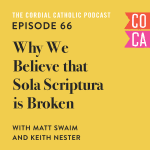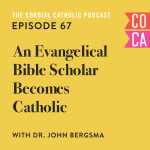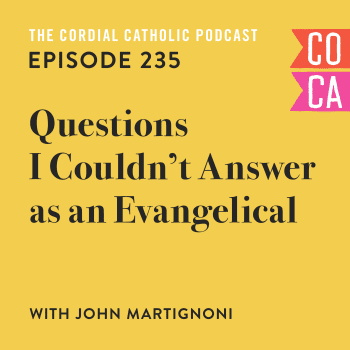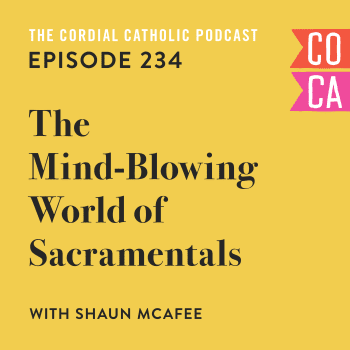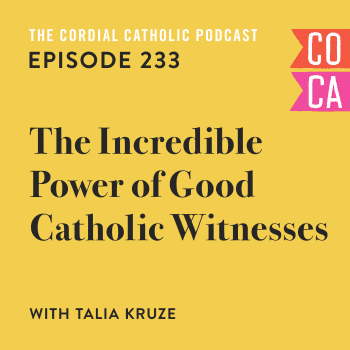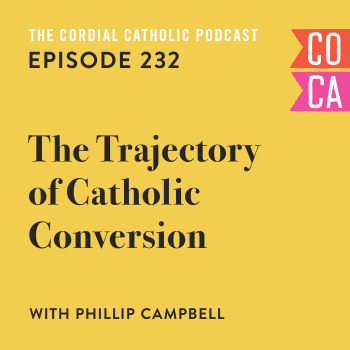
This week, I had the privilege of sitting down with Matt Swaim and Keith Nester to discuss our experience with Sola Scriptura—the idea that the Christian faith can be understood by reading the Bible alone.
Matt, Keith, and myself are all converts from Evangelical Christianity.
Keith, a former pastor, worked in ministry for 22 years before becoming Catholic.
All of us wrestled, in no small part, with the issue of Sola Scriptura and what we found, and what scores of converts before us have found as well, is that trying to live out our Christian faith using only the Bible as our guide was simply impossible. After all, look at the landscape of Protestant Christianity—look at all the different interpretations of Scripture.
Is this the way that God intended us to be Christian: Disagreeing on what the Word of God meant?
For me it began shortly after becoming Christian. I was saved in high school and shortly after immersed myself in reading the Bible, attending church on Sundays, and going to a very vibrant youth group every Friday night. Our meetings were fun—full of teenage angst and hormones—but also a place for lively theological debate and dialogue. Early on, in one of these heated dialogues, I came to realize that appealing to the Bible as our ultimate authority had some particularly fatal flaws.
It came to a point when someone in our youth group began digging into Calvinism and the idea of predestination—does God predestine only certain Christians to be truly saved? It was a question which spawned a debate so fierce that our senior pastor was eventually brought in the quell the conversation. But even his answer didn’t satisfy everyone because, ultimately, he simply shared his interpretation of the same old Bible verses which everyone was throwing around.
It dawned on me, way back then, that something was wrong with the system we, as Evangelical Protestants, were using to live out our faith.We were simply pitting Bible versus against other Bible verses. We were all interpreting the same verses but coming to different conclusions—and how do we know who is right and who is wrong?
It didn’t make sense. But we believed, as Protestant Christians, that it was how we were supposed to live. We believed in this idea called Sola Scriptura, that the Bible is the ultimate and only authority for Christian teaching, but where did this idea come from?
What is even in the Bible?
All Scripture is God-Breathed
It shocked me to learn, as an Evangelical, that there’s actually no verse in the Bible that says the Bible should be the ultimate or only way that we know our faith as Christians.
We, as Evangelicals, held the Bible up as the ultimate authority for what we believed but why did we believe that?
The answer was a bit disappointing.
See, as an Evangelical, I scored the Internet for an answer to this problem. I asked my pastors, I read good theologians, and came to the conclusion that there are really only two places to go in the Bible to answer this conundrum.
The first, comes from 2 Timothy 3:16,
But as for you, continue in what you have learned and have become convinced of, because you know those from whom you learned it, 15 and how from infancy you have known the Holy Scriptures, which are able to make you wise for salvation through faith in Christ Jesus. 16 All Scripture is God-breathed and is useful for teaching, rebuking, correcting and training in righteousness, 17 so that the servant of God may be thoroughly equipped for every good work. (2 Timothy 3:14-16)
Here, Paul is writing to Timothy, a young ordained leader in the Early Church, and giving him some parting instructions before he, Paul, passes away.
This verse is often used to justify the idea that the Bible is the ultimate source of authority because, as we read, Paul tells Timothy that “all Scripture is God-breathed” and then lists all the things that it is good for.
This list is fairly exhaustive so it sounds like Paul is telling Timothy that Scripture is all he needs to learn how to be a Christian.
But let’s look closer.
For one thing, the glaringly obvious fact that I did not see as an Evangelical is that when Paul is talking about Scripture he’s referring to the Old Testament. After all, the New Testament wouldn’t be officially collected together until hundreds of years later. He couldn’t possibly be talking about the Bible as we know it today and, what’s more, he notes that Timothy has “known” these “Holy Scriptures” from his “infancy.” There’s no way then that Paul can be talking about the Bible that we have today; the New Testament certainly wasn’t written when Timothy was an infant.
Unmistakably, Paul is referring to the Old Testament.
If 2 Timothy 3:16 is arguing that Scripture is sufficient for helping a Christian to know how to live then he’s only referring to the Old Testament, which makes no sense.
He Doesn’t Say “Only Scripture”
The second difficulty, which became clear to me when I wrestled through Sola Scriptura, was that nowhere does Paul say “only Scripture” can help teach a Christian how to live as a disciple of Christ.
This is a big deal because as Evangelicals we acted like Scripture was the only game in town to help us become more like Christ.
When we thought about the Catholic, Orthodox, or Anglican churches and all of their traditions which didn’t imagine that these, in any way, could really help someone become a better Christian. If it wasn’t in the Bible it wasn’t biblical and it couldn’t possibly be intended to help us grow in Christian faith.
So we brushed things like the rosary away as superstition or, even worse, as some kind of sinful idolatry.
We did this because we believe that only Scripture contained things which were helpful for the Christian life. Anything not contained in Scripture—like the idea of the prayers of the rosary—were a no go.
But a closer reading of 2 Timothy 3:16 reveals that no where does Paul tell Timothy that “only Scripture” is useful for those things. In fact, earlier in the same letter, Paul tells Timothy to “hold fast to the sound words you have heard from me,” (2 Tim. 1:13). Paul didn’t say “written to you,” or “taught you in written form,” clearly implying that even things Timothy has heard Paul say should be adhered to—even if they weren’t written down.
Clearly, written Scripture, is not the only way a disciple of Christ can be formed.
I’ve written more about this here.
What About the Bereans?
The second place that most arguments for Sola Scriptura come from is of reading of Acts 17.
Here, we learn about the Berean Jews, a “noble” group who, we’re told,
received the message with great eagerness and examined the Scriptures every day to see if what Paul said was true. (11)
In fact, this group is called “more noble” than the Jews in Thessalonica because of their approach to discerning Paul’s message of the Gospel.
But does the imply, in any way, that the Scriptures are the sole rule of Christian faith?
The Berean Jews “examined the Scriptures” to see if what Paul said was true and makes them “noble” as the Bible tells us
Just because the Berean Jews “examined the Scriptures” to see if what Paul said about Jesus and the Christian message was true this doesn’t mean that the Bible contains everything we need to know about living out the faith. After all, and, once again, the Scriptures Paul is referring to is the Old Testament writings.
The Berean’s simply read the Old Testament to confirm that the prophecies about the Messiah, which Paul told them about, were actually fulfilled in Christ. They decided that, indeed, Paul was right, and they became Christians.
But others—even in the Book of Acts itself—became Christian after simply hearing Paul preach. Thousands, in fact, became Christian in this way. Clearly searching the Scriptures wasn’t the only way to learn about how to live as a Christian.
What’s happening in Acts 17:11, is simply that the Berean Jews, who were open to the message of Christ, and searched the Scriptures to confirm its truth, are being contrasted with those in Thessalonica who evidently weren’t as eager for the message (although later a thriving church is established there).
Just because the Berean Jews “searched the Scriptures” to confirm Paul’s message doesn’t mean that the Scriptures contain everything someone needs to know about living the Christ life.
Paul was referring to the Old Testament and, after all, had to preach to them first about Christ before they could confirm his message.
Ultimately Untenable
In the end, what Matt, Keith, and I found trying to live a brand of Sola Scriptura Christianity is that it was simply untenable.
First, we found that nowhere in the Bible is the Bible given as the sole rule of faith—the ultimate authority in and of itself. The verses which we often thought might indicate this fell flat upon closer examination.
When we “searched the Scriptures” we found the evidence for Sola Scriptura to be simply non-existent. Instead, claims seemed to indicate that the Scriptures were one way of knowing God and nowhere indicated to be the only way to know our faith.
Second, we all realized that the Bible needs an interpreter and, more importantly, the lack of one has led to the massive splintering of Protestant Christianity since it began with the Reformation 500 years ago.
On huge issues like how we’re saved, when life begins, and what happens when we die, Protestant Christians are divided based on different interpretations of the Bible.
We realized, too, that there isn’t simply a “plain sense” meaning of the Bible. When devout, honest, and humble Christians are seeking to understand the Scriptures as best they can, and coming to different conclusions, it’s simply impossible to believe that one easily discernible meaning for complicated passages of Scripture can really exist.
And it surely isn’t how God intended it to be.
Instead, the three of us discovered this thing called the Catholic Church.
The Catholic Church, in stark contrast to the Evangelical traditions we all knew, claimed to have the authority to actually interpret Scripture—and to tell Christians how to live.
This audacious claim of authority traced back to the apostles, appointed by Christ, who were given the authority to “bind and loose.”
This authority, claimed by the Catholic Church, has been passed on, and exercised, through the succession of bishops ever since even as the Protestant Reformation fractured the Church.
It was a completely differently way to understand the faith: where we weren’t the sole people deciding which interpretation of Scripture, among many, that we agreed with but humbling ourselves before a tradition which said it was given the authority to say which interpretation was right.
And traced that authority back to Christ.
For Matt, Keith, and I, it was a solution to a problem which we agreed was impossible to overcome otherwise.
To listen to the full discussion with Keith Nester and Matt Swaim click here or listen below,

